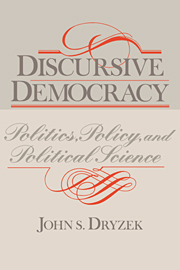3 - Complexity
from II - Political Institutions
Published online by Cambridge University Press: 12 October 2018
Summary
Complex social problems demand effective political responses. My intent in this chapter is to challenge received notions about the character of these responses. Specifically, I will argue that actions based on exclusively instrumental rationality have highly limited capabilities in a complex environment. By implication, the forms of social organization in which instrumental rationality is enshrined, be they Weberian bureaucracies or liberal open societies, are similarly limited. The case against instrumental rationality will be made through reference to three of its most effective modern extensions: analytical problem disaggregation, systems modeling, and structured integration of diverse perspectives on complex issues. The first of these three extensions, the analytical strategy, is central to both bureaucracy and the open society. The second, systems modeling, is a more clearly bureaucratic approach and as such would find little favor with Popperians. The third, integration, finds some place in large formal organizations but is essentially Popperian and critically rationalist in its open problem-solving spirit. After exposing the limits of these three extensions, I shall argue that discursive democracy can contribute more to the resolution of complex social problems than any of the three. This efficacy does not, though, mean that all vestiges of instrumental rationality need be purged. To the extent my argument is convincing, the appearance of some of the realworld intimations of discursive designs in the vicinity of complex problems becomes understandable.
The Weberian Anxiety
Following Max Weber, it has been regarded as axiomatic that increasing orders of social complexity require ever more refined means for the exercise of instrumental rationality in decision making if effective control of a problematic environment is to be achieved and maintained. The Weberian thesis can be applied to any kind of decision process, be it that of a human brain, a corporation, or a government. Currently, the instrumental cognitive capacities of the individual brain are the target of banal aids to “positive thinking” and more sophisticated “modern technologies of reason” (March, 1978, p. 588). In the form of systems analysis, linear programming, decision analysis, and the like, the latter technologies can also be applied and exercised by and in small groups confronted with complexity. With high orders of complexity any such technical assistance becomes insufficient, and harmonization of the efforts of large numbers of individuals is required.
- Type
- Chapter
- Information
- Discursive DemocracyPolitics, Policy, and Political Science, pp. 57 - 76Publisher: Cambridge University PressPrint publication year: 1990



